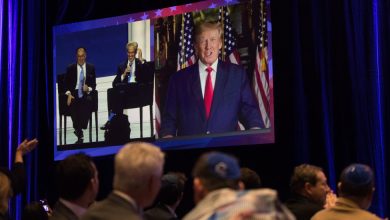Michael Flynn Invokes Fifth Amendment Before Jan. 6 Panel

WASHINGTON — The House committee investigating the Jan. 6 attack on the Capitol ran into a familiar roadblock on Thursday as yet another high-profile witness invoked his right against self-incrimination rather than answer questions about the events that led to a mob assault on Congress.
Michael T. Flynn, a former national security adviser who was one of the most extreme voices in former President Donald J. Trump’s push to overturn the election, repeatedly cited the Fifth Amendment before the committee because, his lawyer said, he believes the panel is exploring criminal referrals against Mr. Trump and his allies.
“This privilege protects all Americans, not just General Flynn,” Mr. Flynn’s lawyer, David Warrington, said in a statement.
Mr. Flynn became at least the fifth high-profile witness to sit for a lengthy interview with the panel only to decline — over and over again — to answer the committee’s questions. Others citing the Fifth Amendment before the committee include Jeffrey Clark, a former Justice Department lawyer who participated in Mr. Trump’s frenzied attempts to overturn the election; John Eastman, a conservative lawyer who wrote a memo that some in both parties have likened to a blueprint for a coup; the political operative Roger J. Stone Jr.; and the conspiracy theorist Alex Jones.
Mr. Eastman and his lawyer invoked the Fifth Amendment 146 times during his deposition, repeatedly stating the word “fifth” instead of uttering complete sentences. Mr. Jones said he invoked the Fifth Amendment nearly 100 times. Mr. Stone said he did so to every question asked.
Some high-profile witnesses settled on that strategy after the committee initially recommended criminal contempt of Congress charges against three witnesses — the former Trump adviser Stephen K. Bannon, the former White House chief of staff Mark Meadows and Mr. Clark — who refused to answer questions.
But before the committee forwarded a contempt recommendation to the full House, Mr. Clark’s lawyer let the panel know he would sit for another interview in which he repeatedly invoked his right against self-incrimination. That effectively ended the potential contempt charge against him.
Despite the refusal of some high-profile witnesses to answer questions, the committee has used other tactics to get answers, including questioning lower-level staff members. The panel has also discussed the possibility of granting some witnesses immunity to encourage them to participate, a strategy that was used dozens of times during Congress’s investigation of the Iran-contra scandal in the 1980s.
The House committee has said it wants information from Mr. Flynn because he attended a meeting in the Oval Office on Dec. 18, 2020, in which participants discussed seizing voting machines, declaring a national emergency, invoking certain national security emergency powers and continuing to spread the false idea that the election was tainted by widespread fraud.
That meeting came after Mr. Flynn gave an interview to the right-wing media site Newsmax in which he talked about the purported precedent for deploying military troops and declaring martial law to “rerun” the election.
Capitol Riot’s Aftermath: Key Developments
The first trial. Guy Wesley Reffitt, a Texas man who helped lead a pro-Trump mob against the police during the Jan. 6 attack on the Capitol, was convicted of obstructing Congress’s duty to certify the 2020 election. The verdict brought an end to the first criminal trial to stem from the riot.
Ex-Proud Boys leader indicted. A federal grand jury has charged Enrique Tarrio, the former leader of the Proud Boys, with conspiracy in the Jan. 6 attack on the Capitol. He is the second leader of a far-right group to face charges in the investigation of the attack.
The potential case against Trump. The Jan. 6 House committee said there was enough evidence to conclude that former President Donald J. Trump may have engaged in a criminal conspiracy as he fought to remain in office. The move adds to pressure on the Justice Department to prosecute him.
After the deposition on Thursday, Mr. Warrington took umbrage at what he said were insinuations from the committee’s staff that Mr. Flynn’s “decision to decline to answer their questions constituted an admission of guilt.”
“The committee’s view that the invocation of the Fifth Amendment is an admission of guilt is in conflict with nearly 250 years of American jurisprudence and represent a disturbing denial of the meaning and existence of this vital constitutional right,” Mr. Warrington said.
Mr. Flynn has sued the committee to try to block its subpoena, and Mr. Warrington argued that the panel should have waited to depose Mr. Flynn until after his lawsuit was resolved. He also accused the committee of basing some of its questions on information from “fringe news and conspiracy websites and rumors.”





